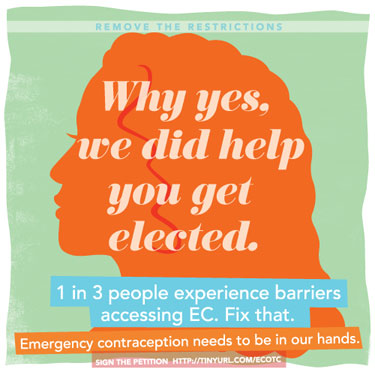Emergency Contraception Should Be Available Over The Counter. And You Can Make That Happen
Last week, the American College of Obstetricians and Gynecologists called for access to emergency contraception over-the-counter. We need to send a clear signal to Secretary Sebelius that women’s reproductive health and medical science should be the driving force behind public policy. Sign the petition being launched by a broad coalition of medical professionals and advocates today urging Secretary Sebelius to revisit the evidence and remove the restrictions.

Last week’s announcement from the esteemed American College of Obstetricians and Gynecologists (ACOG), suggesting it’s time to make oral contraceptives accessible without a prescription, is the perfect way to re-ignite and re-engage public conversation about making emergency contraception (EC) available without restriction. We cannot afford another decade of political delays when it comes to common sense measures to improve women’s health.
Doctors are taking the lead by acknowledging they’ve become unnecessary obstacles between women and their birth control. That is an example politicians need to follow. Medical science, not political ideology, should govern which products are safe and effective. It is clear women of all reproductive ages will be better off when emergency contraception is easily accessible and in their hands.
One year ago next week the Food and Drug Administration was poised to announce that EC had been approved for on-the-shelf access, such that it could appear at your local pharmacy between condoms and pregnancy test kits. But Health and Human Services (HHS) Secretary Kathleen Sebelius stepped in at the last minute and ruled that Plan B One-Step and its generic equivalent must remain behind-the-counter. That decision led to confusion and unnecessary obstacles for women, teens, and couples at the very moment clarity was needed most. For example, we know that:
- Doctors and teens have been given misinformation about the age restrictions applied to emergency contraception over the counter (currently 17) or told that teens could not get the product at all (not true). This confusion helps no one.
- Men have been told by pharmacists in several states around the country that they could not buy EC (not true), presenting obstacles and delays when timing matters.
- Individuals without government issued identification may have difficulty accessing EC because of the restrictions.
In addition to the practical confusion the Sebelius ruling created, it also set a dangerous policy precedent. Never before has HHS overruled the FDA on a product that had been as thoroughly vetted and researched as EC. To the extent the concern about teens accessing EC was something the Obama Administration didn’t want to have to deal with during the election, they should clearly understand now that the women, young voters, and communities of color who stood in line at the polls did so in part because access to contraception, and the choice it represents in all our lives, is important.
For example, today 82 percent of teen pregnancies are unintended. Seventy percent of teens in New York City who became pregnant between 2011-2012, dropped out of school. Increased, evidence-based access to EC could give these teens a second chance to prevent pregnancy and stay in school. But research reveals that because of widespread confusion, 50 percent of teens seeking EC were told the wrong age requirements for buying it.
The science supporting EC hasn’t changed, but the politics sure have. We need to send a clear signal to Secretary Sebelius that women’s reproductive health and medical science should be the driving force behind public policy. A broad coalition of medical professionals and advocates is launching a petition today to urge Secretary Sebelius to revisit the evidence and remove the restrictions.
Please sign it and share it with your friends. Engage people in conversation about the important issues on social media and help demonstrate the strong consensus for common sense public policy that puts health and science over political ideology. We want to get as many signatures as possible before the one-year anniversary of the Sebelius decision on December 7th, please sign, share, and continue to make your voice heard.

